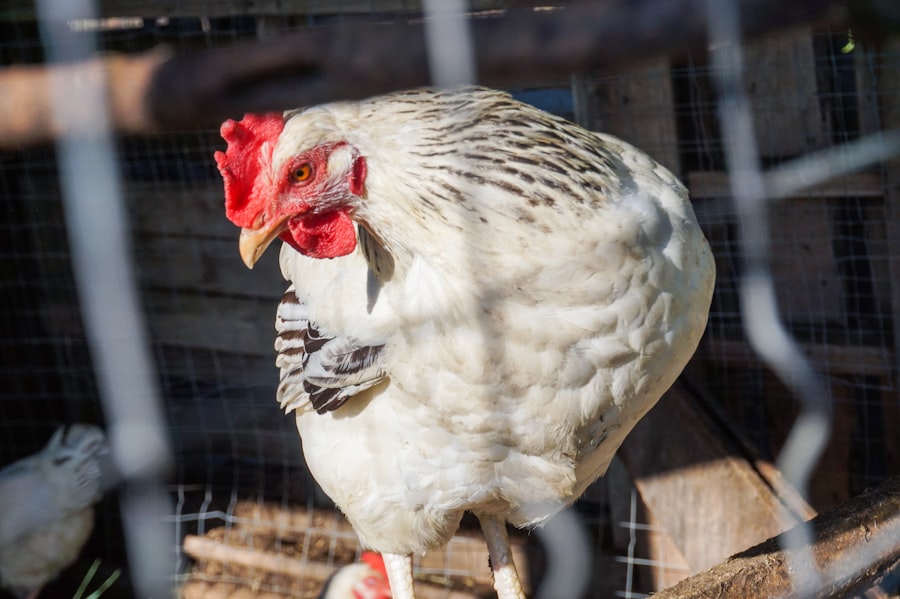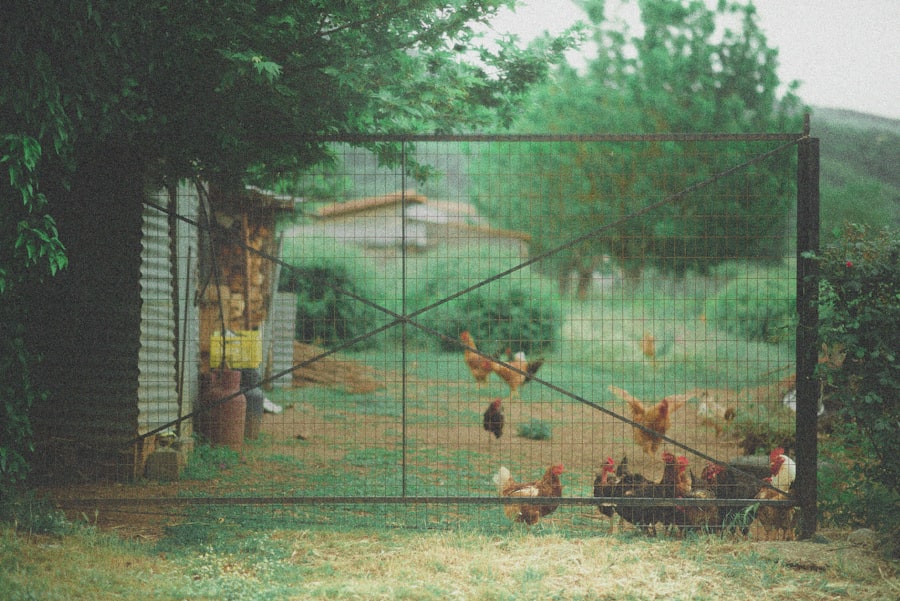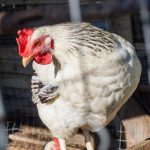When selecting a chicken coop, several factors should be considered. Size is crucial, with a minimum of 2-3 square feet per chicken recommended, though more space is beneficial. The coop’s layout should include nesting boxes, roosting bars, and adequate ventilation.
Nesting boxes provide a secure area for egg-laying, roosting bars offer perching space, and proper ventilation maintains air quality and prevents moisture accumulation. The coop’s material is another important consideration. Wood offers natural insulation and aesthetic appeal but requires regular maintenance.
Metal coops are durable and easy to clean but may require additional insulation. Plastic coops are lightweight and low-maintenance but may offer less protection against predators. The choice of material depends on climate, budget, and personal preferences.
The coop’s location is also significant. It should be placed in a well-drained area with ample sunlight and protection from strong winds to ensure the chickens’ comfort and health throughout the year.
Table of Contents
Key Takeaways
- Choose a coop that is spacious, well-ventilated, and predator-proof
- Set up the coop in a quiet, shaded area with easy access to food and water
- Provide a balanced diet and clean water for your chickens
- Offer entertainment and enrichment such as perches, dust baths, and toys
- Regularly clean the coop and provide proper waste management to prevent health issues
- Monitor your chickens’ health and behavior for signs of illness or stress
- Implement predator-proofing measures such as secure fencing and locking mechanisms
Setting Up the Coop
Preparing the Ground
Once you’ve chosen the right coop for your chickens, it’s time to set it up for their comfort and safety. Start by preparing the ground where the coop will be placed. Clear away any debris and level the ground to create a stable foundation for the coop.
Assembling the Coop
If your coop doesn’t have a built-in floor, consider adding a layer of hardware cloth or wire mesh to prevent predators from digging underneath. Next, assemble the coop according to the manufacturer’s instructions, making sure to secure all components tightly to prevent any gaps or weak spots that could compromise the coop’s security. Once the coop is assembled, add bedding material such as straw or wood shavings to the floor to provide a soft and absorbent surface for your chickens to walk and rest on.
Creating a Safe Outdoor Run
After setting up the coop, it’s important to consider the surrounding area as well. Create a secure outdoor run attached to the coop where your chickens can safely roam and exercise during the day. This run should be enclosed with wire mesh or fencing to keep out predators and provide ample space for your chickens to forage and explore.
Adding Final Touches
Additionally, consider adding some shade and shelter within the run, such as a covered area or small trees, to protect your chickens from extreme weather conditions. Finally, install a secure door or gate to the run that can be easily opened and closed to allow your chickens access to the outdoors while keeping them safe from potential threats.
Feeding and Watering

Proper feeding and watering are essential for keeping your chickens healthy and happy. When it comes to feeding, provide your chickens with a balanced diet that includes a mix of commercial feed, grains, fruits, vegetables, and occasional treats. Choose a high-quality commercial feed that is specifically formulated for laying hens or broilers, depending on the type of chickens you have.
This feed should contain essential nutrients like protein, vitamins, and minerals to support your chickens’ overall health and egg production. In addition to commercial feed, offer your chickens access to grains like corn, wheat, and oats, as well as fresh fruits and vegetables like leafy greens, carrots, and berries. These foods provide additional nutrients and help keep your chickens entertained as they peck and scratch for their favorite treats.
In addition to food, make sure your chickens have access to clean and fresh water at all times. Provide water in sturdy containers that are resistant to tipping and contamination. Consider using nipple waterers or automatic waterers to ensure a constant supply of water without the risk of spills or fouling.
During hot weather, add ice cubes or frozen water bottles to help keep the water cool and refreshing for your chickens. It’s also important to regularly clean and refill the water containers to prevent bacterial growth and algae buildup. Proper hydration is crucial for your chickens’ health and egg production, so make sure they always have access to clean water throughout the day.
Providing Entertainment and Enrichment
Chickens are curious and social animals that benefit from mental stimulation and enrichment activities. Providing entertainment and enrichment in the form of toys, perches, and environmental stimuli can help prevent boredom and reduce stress in your flock. Consider adding hanging mirrors or shiny objects inside the coop or run to pique your chickens’ curiosity and provide visual stimulation.
You can also hang treat dispensers or puzzle feeders filled with mealworms or other treats to encourage natural foraging behaviors and keep your chickens engaged. In addition to toys, provide plenty of perches and climbing structures for your chickens to roost on and explore. Perches should be placed at different heights and levels to encourage exercise and movement while also giving your chickens a sense of security and comfort.
Natural branches or wooden logs make excellent perches as they provide a textured surface for your chickens’ feet and nails. You can also create elevated platforms or ramps for your chickens to climb on, offering them opportunities for exercise and exploration. Another way to enrich your chickens’ environment is by introducing new elements such as straw bales, hay piles, or dust bathing areas.
These natural materials provide opportunities for your chickens to engage in instinctive behaviors like scratching, pecking, and dust bathing. Dust bathing is particularly important for maintaining your chickens’ feather health as it helps control parasites and keeps their skin clean and free from excess oils.
Maintaining Cleanliness
Maintaining cleanliness in and around the coop is crucial for preventing disease and promoting good health in your flock. Start by regularly cleaning out the coop bedding to remove soiled material and prevent ammonia buildup from urine and feces. Replace the bedding with fresh material as needed to keep the coop clean and odor-free.
Additionally, regularly clean out the nesting boxes to remove any soiled bedding or eggs that may have been broken. In the outdoor run, regularly rake up droppings and soiled bedding to prevent the buildup of bacteria and parasites. Consider using a deep litter method in the run by adding layers of straw or wood shavings that can break down over time with the help of beneficial microorganisms.
This method helps control odors and provides a natural substrate for your chickens to scratch and forage in. It’s also important to regularly clean and sanitize water containers, feeders, and any toys or enrichment items in the coop or run. Use a mild detergent or vinegar solution to scrub away any dirt or debris before rinsing thoroughly with clean water.
This will help prevent bacterial growth and keep your chickens’ environment clean and hygienic.
Monitoring Health and Well-being

Detecting Signs of Illness or Injury
Look for any signs of illness or injury, such as lethargy, decreased appetite, abnormal droppings, respiratory issues, or changes in feather condition.
Controlling External Parasites
Regularly inspect your chickens for external parasites like mites or lice by parting their feathers and examining their skin closely. If you notice any signs of infestation, take immediate action by treating your chickens with appropriate parasite control products or seeking advice from a veterinarian.
Promoting Mental Well-being
In addition to physical health, pay attention to your chickens’ mental well-being. Chickens are social animals that thrive on companionship and interaction with their flock mates. Ensure they have ample space to move around freely without overcrowding, as well as opportunities for socialization through perches, dust bathing areas, and enrichment activities.
Dealing with Predators
Predators pose a constant threat to backyard chicken flocks, so it’s important to take proactive measures to protect your chickens from potential threats. Start by securing the coop with sturdy locks on all doors and windows to prevent unauthorized entry by predators such as raccoons, foxes, or stray dogs. Consider adding hardware cloth or wire mesh over windows and vents to further deter predators from gaining access.
In the outdoor run, install a secure fence that extends underground to prevent digging by predators like foxes or coyotes. Use wire mesh with small openings that predators cannot squeeze through or break through easily. Additionally, consider adding an electric fence around the perimeter of the run for added protection against larger predators.
Another effective way to deter predators is by using motion-activated lights or sound devices near the coop or run. These devices can startle potential predators and discourage them from approaching your chickens’ living area. In conclusion, choosing the right coop for your chickens is crucial for their comfort and safety.
Setting up the coop involves careful consideration of factors like size, layout, material, location, and surrounding area. Feeding and watering your chickens properly is essential for their health and well-being, while providing entertainment and enrichment helps prevent boredom and reduce stress in your flock. Maintaining cleanliness in the coop and run is crucial for preventing disease, while monitoring your chickens’ health and well-being allows you to address any issues promptly.
Finally, dealing with predators requires proactive measures such as securing the coop with locks, installing secure fencing, and using deterrents like motion-activated lights or sound devices. By following these guidelines, you can create a safe and comfortable environment for your backyard chicken flock while promoting their overall health and happiness.
If you’re looking for more ideas on how to keep chickens in a coop in Stardew Valley, you might want to check out this article on chicken coop interior ideas. It offers some great tips on how to set up the inside of your coop to keep your chickens happy and healthy.
FAQs
What is Stardew Valley?
Stardew Valley is a popular farming simulation game where players can build and manage their own farm, raise animals, grow crops, and engage in various activities to improve their farm and the surrounding community.
How do I keep chickens in a coop in Stardew Valley?
To keep chickens in a coop in Stardew Valley, you will need to first build a coop on your farm. Once the coop is built, you can purchase chickens from Marnie’s Ranch and place them inside the coop. Make sure to provide them with food and water daily, and collect their eggs regularly.
What do chickens eat in Stardew Valley?
Chickens in Stardew Valley eat hay, which can be purchased from Marnie’s Ranch. You can also let them outside to forage for grass, or purchase a silo to store hay for them to eat.
How do I take care of chickens in Stardew Valley?
To take care of chickens in Stardew Valley, make sure to provide them with food and water daily, let them outside to forage for grass, and collect their eggs regularly. You can also pet them to increase their happiness and produce higher quality eggs.
How do I incubate eggs in Stardew Valley?
To incubate eggs in Stardew Valley, you will need to place the eggs in an incubator inside the coop. After a few days, the eggs will hatch into baby chicks, which will grow into adult chickens over time.
Meet Walter, the feathered-friend fanatic of Florida! Nestled in the sunshine state, Walter struts through life with his feathered companions, clucking his way to happiness. With a coop that’s fancier than a five-star hotel, he’s the Don Juan of the chicken world. When he’s not teaching his hens to do the cha-cha, you’ll find him in a heated debate with his prized rooster, Sir Clucks-a-Lot. Walter’s poultry passion is no yolk; he’s the sunny-side-up guy you never knew you needed in your flock of friends!







